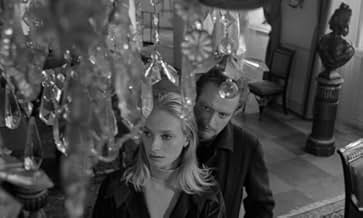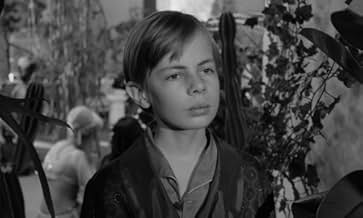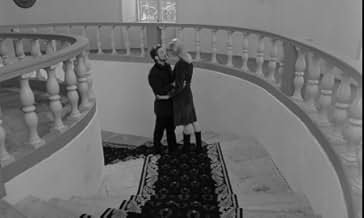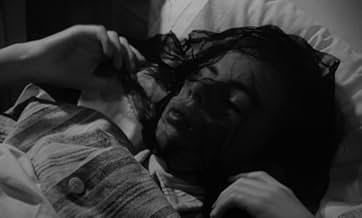L'histoire d'un homme qui essaie de se débarrasser des souvenirs de son passé. Il a grandi dans une famille de classe supérieure dans un château et revisite maintenant le château avec sa fia... Tout lireL'histoire d'un homme qui essaie de se débarrasser des souvenirs de son passé. Il a grandi dans une famille de classe supérieure dans un château et revisite maintenant le château avec sa fiancée.L'histoire d'un homme qui essaie de se débarrasser des souvenirs de son passé. Il a grandi dans une famille de classe supérieure dans un château et revisite maintenant le château avec sa fiancée.
- Réalisation
- Scénario
- Casting principal
- Récompenses
- 1 victoire et 1 nomination au total
Cleo Boman
- Festdeltagare
- (non crédité)
Arne Domnérus
- Orkesterledare
- (non crédité)
Monique Ernstdotter
- Festdeltagare
- (non crédité)
Avis à la une
The film, which premiered at the 27th Venice International Film Festival, caused so much controversy at the time that the Venice jury had to watch the film in a special room.
The name of the film at the center of all these discussions is Jörgen Lindström, who started his cinema career at the age of 9 and starred in 4 films that went down in golden letters in the history of cinema, three of which were directed by Ingmar Bergman. He left the cinema at the age of 12 and started editing films after university.
I mean, it's very difficult to shoot this movie today.
Swedish cinema consists of cinema workers who love to walk successfully on a tight rope...
The name of the film at the center of all these discussions is Jörgen Lindström, who started his cinema career at the age of 9 and starred in 4 films that went down in golden letters in the history of cinema, three of which were directed by Ingmar Bergman. He left the cinema at the age of 12 and started editing films after university.
I mean, it's very difficult to shoot this movie today.
Swedish cinema consists of cinema workers who love to walk successfully on a tight rope...
10dje-4
Jan (Keve Hjelm) grooved up in an over class environment and with a strong attachment to his egocentric and cold-hearted mother Irene (Ingrid Thulin). After many years, he returns to his childhood environment, an old mansion that have stood empty for a long time, but the memories live on.
Jan (Keve Hjelm) fights impotence (literal and symbolic) and anguished childhood memories in a decadent Swedish castle where risqué parties and daring scenes defy 1960s' movie censorship, reaffirming the ground-breaking role of Swedish films in helping advance adult, sexually concerned themes in international cinema (q.v. Bergman's "Through a Glass Darkly", "The Silence" and "Persona", Vilgot Sjöman's "My Sister My Love/ Syskonbädd 1782" and "I am Curious Yellow", etc). "Night Games" includes a bold flashback scene of Jan as a child (sensitive Jörgen Lindström, who played the young boy in Bergman's "The Silence") caught masturbating.
Former Swedish star Mai Zetterling's third directorial effort is particularly interesting for atmosphere, decors and cast, but the film is heavily depressing and the rather obvious symbolisms have dated badly. Sphynx-like, marvelous Ingrid Thulin has a field day as the bitchy and sensuous mother; Keve Hjelm is engagingly honest in a role that requires bravado and emotional range. The film is influenced by Bergman's "angst" films but also has an expressionist touch to it, because of Rune Ericson's camera-work and experiments with different lenses.
If you like films with decadent-bourgeois flavor and angst-filled characters, this is for you. Of course, it's also a must for Ingrid Thulin fans, but it's probably a very difficult film to find these days. My vote: 6 out of 10.
Former Swedish star Mai Zetterling's third directorial effort is particularly interesting for atmosphere, decors and cast, but the film is heavily depressing and the rather obvious symbolisms have dated badly. Sphynx-like, marvelous Ingrid Thulin has a field day as the bitchy and sensuous mother; Keve Hjelm is engagingly honest in a role that requires bravado and emotional range. The film is influenced by Bergman's "angst" films but also has an expressionist touch to it, because of Rune Ericson's camera-work and experiments with different lenses.
If you like films with decadent-bourgeois flavor and angst-filled characters, this is for you. Of course, it's also a must for Ingrid Thulin fans, but it's probably a very difficult film to find these days. My vote: 6 out of 10.
I gave it 3 because the cinematography is really rather good, and Naima Wifstrand, a stalwart of Swedish cinema for decades, is in the cast. Otherwise it's trash, and would have been included in Pauline Kael's wonderful essay The Come-Dressed-As -The-Sick-Soul-of-Europe Parties if it had been made a few years earlier. This is the kind of movie that is made to shock the bourgeoisie, and I am not the least surprised that Shirley Temple was horrified by it. It fails however on the most fundamental level--that of revealing something important about the hero's psyche. Instead we are given party scenes that go on forever, with grotesque characters you'd never meet outside of a mental hospital.
Criterion channel brought back three of Mai Zetterling's films from the 60's, and on the evidence of Night Games they shouldn't have bothered.
Criterion channel brought back three of Mai Zetterling's films from the 60's, and on the evidence of Night Games they shouldn't have bothered.
There is a reason why this film is unknown and forgotten. "Nattlek" is quite bad. It is not as good as Mai Zetterling's "Älskande Par" or "the Girls" (which I consider as the best Swedish film ever made).
I was looking forward to seeing this film. It was released on DVD in Sweden, so I jumped at the chance to watch it. It sounded good, or at least interesting. Ingrid Thulin, who was always a good actress, was typecast here as a neurotic mother to a little boy, (reminds me of the decadence in "the Damned" by Visconti). When the boy is an adult he takes with him his girlfriend to the castle where he grew up and they face his childhood demons.
The girlfriend played by fresh faced Lena Brundin gives the film some humanity but she has to play opposite Keve Hjelm who is very dull and plays his role in the pretentious acting style people back then thought was serious and worthy. Famous Swedish jazz singer Monica Zetterlund livens things up but has a too brief part in this film.
Crazy party guests and relatives try to give the film a feeling of Fellini and Bergman without any feeling or depth. Borrowing fashionable ingredients from other films does not an art-house classic make. The film is interesting to watch as a document of its time. The arty psychodrama films went out of style. This type of film killed itself.
I was looking forward to seeing this film. It was released on DVD in Sweden, so I jumped at the chance to watch it. It sounded good, or at least interesting. Ingrid Thulin, who was always a good actress, was typecast here as a neurotic mother to a little boy, (reminds me of the decadence in "the Damned" by Visconti). When the boy is an adult he takes with him his girlfriend to the castle where he grew up and they face his childhood demons.
The girlfriend played by fresh faced Lena Brundin gives the film some humanity but she has to play opposite Keve Hjelm who is very dull and plays his role in the pretentious acting style people back then thought was serious and worthy. Famous Swedish jazz singer Monica Zetterlund livens things up but has a too brief part in this film.
Crazy party guests and relatives try to give the film a feeling of Fellini and Bergman without any feeling or depth. Borrowing fashionable ingredients from other films does not an art-house classic make. The film is interesting to watch as a document of its time. The arty psychodrama films went out of style. This type of film killed itself.
Le saviez-vous
- AnecdotesFormer child star Shirley Temple quit the board of the San Francisco Film Festival to protest its decision to show Nattlek (Night Games). She regarded it as pornography.
- ConnexionsFeatured in Vielleicht bin ich wirklich eine Zauberin (1989)
- Bandes originalesMarch (from 'Music for the Funeral of Queen Mary') in C minor, Z. 780
Composed by Henry Purcell (1695)
Meilleurs choix
Connectez-vous pour évaluer et suivre la liste de favoris afin de recevoir des recommandations personnalisées
- How long is Night Games?Alimenté par Alexa
Détails
- Date de sortie
- Pays d’origine
- Langues
- Aussi connu sous le nom de
- Night Games
- Lieux de tournage
- Roslagen, Uppland, Suède(province where the action is set)
- Société de production
- Voir plus de crédits d'entreprise sur IMDbPro
- Durée1 heure 45 minutes
- Couleur
- Rapport de forme
- 1.66 : 1
Contribuer à cette page
Suggérer une modification ou ajouter du contenu manquant































